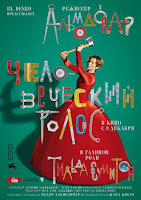Almodovar's "The Human Voice"
The movie is, basically, a monologue, where Scottish actress Tilda Swinton, in a riveting performance, displays her vocal versatility to disclose all the feelings of a woman who has been abandoned by her ex-lover and receives a last telephone call to sort out the last mundane details of their separation: she pretends to be cool and casual at the beginning of the call, until she can't stand her own lies any longer, loses controls and admits to her ex-lover -who is a "dweeb", in Tilda's words, ("an idiot", in Spanish "un memo, un baboso"), that she is just a nervous wreck.
The drama of the monologue is set in the unique atmosphere of Almodóvar's films which is created by the music of Alberto Iglesias and the photography of José Luis Alcaine, the paintings by Artemisia Gentileschi, Vargas, Man Ray, Isabel Quintanilla, Giorgio de Chirico and all the loud colours, objects, circles, shapes and squares of Almodóvar's personal universe.
Below you can watch a facetime interview to Pedro Almodóvar and Tilda Swinton when they presented the film in the the New York Film Festival at the Lincoln Centre in September 2020. The video is very long (1:04:19), but it is interesting to listen to Almodóvar's English, although at some points he turns to Spanish to be translated by a consecutive interpreter (for example when he starts talking about the sets and the scenery of the film at 29:01 and continues talking about the lockdown during the pandemic).
A highlight of the interview is Tilda Swinton's long answer to the question about her character who is in a world that is a mixture of a theatre stage and a cinema set (36:00- 42:11). She explains that the telephone helps her character to create a fabrication of reality, a performance to deceive her ex-lover on the phone, in contrast to the first minutes of Almodóvar's film, where she is silent and we can see her true feelings. Although you can watch the video with subtitles, Tilda Swinton's complex and metaphorical answers are recommended for C1 students and above, whereas Almodóvar's answers in English can be easily understood by B2 students.
In the six minutes of Tilda Swinson's answer you can notice her richness of expression, for example: deception, to dissemble, the predicament, painful, a dignified goodbye, to fall apart, a fabrication, inarticulacy, articulacy, a pose, utterances, the script, an axe, to smash [a glass], frankly, it's overacting, to overdo something, incredibly moving, a trope, a cliche, a soap opera, a set, to fake [it], to throw open your heart, to spill your guts, it's not good taste, a massive meltdown, a dweeb, a twist and turn, to twiddle with [something], vulnerability, fakery.
If you are very interested in "The Human Voice", you can watch the trailer here, you can also watch this interview to Tilda Swinson by Mark Kermode on BBC Radio 5 which is shorter and very precise (07:39) with or without subtitles, or another interview to Ms. Swinson at the 77th Venice Festival (6:03), where she was awarded the Honorary Golden Globe for a lifetime achievement.
"The Human Voice" can be watched on Movistar TV beginning on September 3rd, 2021. Recently, Almodovar presented "Parallel Mothers", his latest film, at the Venice Film Festival.




Comments
Post a Comment